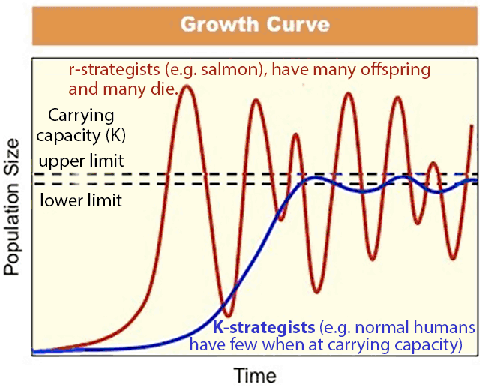
THURSDAY, FEB 16, 2023: NOTE TO FILE

Degrowth Can Work
Here’s how science can help
Eric Lee, A-SOCIATED PRESS
TOPICS: CUP OF JOE, FROM THE WIRES, DEGROWTH NOW!
Intro: The above title if from an article published in Nature, Dec 2022 in the comments section. The premiere science journal editors (as likely many readers will) deem the content of the comments expressed to be of interest, as perhaps vitally important to consider. Okay, so read the comment on why degrowth will work:
COOS BAY (A-P) — The comment:
Degrowth can work — here’s how science can help: Wealthy countries can create prosperity while using less materials and energy if they abandon economic growth as an objective.
Authors: Jason Hickel, Giorgos Kallis, Tim Jackson, Daniel W. O’Neill, Juliet B. Schor, Julia K. Steinberger, Peter A. Victor & Diana Ürge-Vorsatz
.......................
First, don't read the article/comment, but vet sources (Nature is a top science journal, a British weekly first published in 1869, i.e. is the world's leading multidisciplinary science journal of consensus thinking).
Sorry, but this step cannot be skipped in today's increasingly post-truth world, even (or especially) at the top of the information/misinformation pyramid. And the opining authors:
- Jason Hickel: Economic anthropologist, focus on ecological economics, global inequality, imperialism and political economy, author of The Divide: A Brief Guide to Global Inequality and its Solutions (2017) and Less Is More: How Degrowth Will Save the World (2020). He is a humanities academic and noted author/public intellectual like Steven Pinker and Noam Chomsky if not as noted.
- Giorgos Kallis: PhD, Environmental Studies, University of the Aegean (2003), Masters in Economics (2012), recent research (2019) ‘Limits. Why Malthus was wrong and why environmentalists should care’
- Tim Jackson: British ecological economist and professor of sustainable development, author of Prosperity Without Growth (2009) [I read] and Post Growth—Life After Capitalism was published (2021) [I likely won't read].
- Daniel W. O’Neill: Lead author (2018) 'A good life for all within planetary boundaries' cited by Wikipedia article on Doughnut Economics.
- Juliet B. Schor: Economist and Sociology Professor at Boston College, author of five best-sellers, e.g. Plenitude: The New Economics of True Wealth (2010).
- Julia K. Steinberger: Professor of Ecological Economics at the University of Lausanne, lead author Urbanisation knowledge module of the International Institute for Applied Systems Analysis (IIASA) Global Energy Assessment and is on the Steering Committee of Future Earth. In October 2022, Steinberger participated at a road blockage in Bern with the Swiss ecological movement Renovate Switzerland, and glued her hand to the pavement alongside five other people.
- Peter A. Victor: economist at York University in Toronto, Ontario and author of Managing Without Growth: Slower by Design, Not Disaster (no Wikipedia entry, but published a comment in Nature, 'Questioning economic growth' 2010).
- Diana Ürge-Vorsatz: Professor of Environmental Sciences at Central European University, Director of the Center for Climate Change and Sustainable Energy Policy, published widely on environmental and energy studies, primarily climate change mitigation, MS in physics (1982), PhD Environmental Science and Engineering University of California (1996), coordinating lead author of both the Fourth and Fifth Assessment Reports (AR4 and AR5), author (2018) 'Sustainable Development Goals and climate change adaptation in cities', and lead author (2020) 'Advances Toward a Net-Zero Global Building Sector'.
For a first quick look I typically use Wikipedia, but sometimes a deep dive using advanced search is required, and if the publisher has already been vetted, I may skip that vital step.
Now, read the comment: Degrowth can work — here’s how science can help
With one exception, the authors have no background in natural history/sciences and none would likely agree that neoclassical economics is a pretend science nor that modern techno-industrial society is non-viable in any form.
Okay, from the article, 3rd paragraph:
'Researchers in ecological economics call for a different [to growth as usual] approach — degrowth. Wealthy economies should abandon growth of gross domestic product (GDP) as a goal, scale down destructive and unnecessary forms of production to reduce energy and material use, and focus economic activity around securing human needs and well-being. This approach, which has gained traction in recent years, can enable rapid decarbonization and stop ecological breakdown while improving social outcomes. It frees up energy and materials for low- and middle-income countries in which growth might still be needed for development. Degrowth is a purposeful strategy to stabilize economies and achieve social and ecological goals, unlike recession, which is chaotic and socially destabilizing and occurs when growth-dependent economies fail to grow.'
If I were asked to join as co-author, I would pause at the point I was no longer singing along [and author a few notes of change in the narrative]:
'Researchers in ecological economics call for a different approach — degrowth. Wealthy economies should abandon growth of gross domestic product (GDP) as a goal, scale down destructive and unnecessary forms of production to reduce energy and material use, and focus economic activity around securing human needs and well-being...'
'...and focus economic activity around securing human needs and well-being'... [by rapidly degrowing the human population faster than the global economy contracts.]
‘This approach, which has [NOT!] gained traction in recent years, can enable rapid decarbonization and stop ecological breakdown while improving social outcomes [during descent and after the rapid depopulation by natural old age death period of about 80 years]. It frees up energy and materials for low- and middle-income countries in which [a local increase in material/energy flows] might still be needed [during economic contraction to prevent/mitigate Malthusian deaths]. Degrowth is a purposeful strategy to stabilize economies and achieve social and ecological goals, unlike recession, which is chaotic and socially destabilizing and occurs when growth-dependent economies fail to grow.’
[Full STOP.]
So, add a few (13) words and shorten the comment. But would Nature publish it?
Where's that latte I ordered? That's what I want to know.
SUBNOTE TO FILE 2/17/23
A question on how degrowth can work:
“Wealthy countries can create prosperity while using less materials and energy if they abandon economic growth as an objective.”
We have an economic house of cards. I would be very interested to see well-thought-out scenarios about moving to a steady state economy without triggering a depression. Or, if that bar is too high, simply scenarios about how we slow the economy. References? Suggestions? —Andrew Gaines

The quote from the tagline is the short of it, but to focus on the envisioned solution:
"... abandon economic growth as an objective” [and then a miracle occurs] and we [50 million, 500 million, 5 billion?] transition to a steady state economy to create prosperity (without growth) in an equitable circular/doughnut economy for all where everyone [5/50/500/5000/50000 million?] live in 195 equally wealthy countries (or maybe in a million groups of 20 to 50 trusted-with-your-life renormalized humans).
As always, if the claimed solution is to abandon economic growth as an objective, then the ecolate question is, "And then what?" [and omit the and "then a miracle occurs" part of the narrative] in your answer which seeks to envision the answer Mother Nature will select for if the level of error, ignorance, and illusion embodied in your answer is not too vast.
We also have a conceptual house of cards built on the shifting sands of self-serving, short-term self interest in maximizing (i.e. by becoming time blind, posterity blind, and energy blind) narratives of expansion as the best thing ever (because in the short term it obviously is as all expansionists 'know', i.e. believe and for a time experience as absolute proof they are right).
By 1973, Howard T. Odum, systems ecologist, had been marginalized by American ecologists as too 'idiosyncratic' (his daughter, Mary Odum, told me he stopped going to ecological conferences because they had stopped listening). The Royal Swedish Academy of Sciences, however, was willing to listen and invited H.T. Odum to address them, which he did. A copy of a copy of a mimeographed copy was circulated among the few willing to consider his claim to having 'a better view', which was published by Mother Earth News in 1974. I reconstructed the article as an HTML page. Having noted humanity's problem, he asked the obvious:
"What is the general answer? Eject economic expansionism, stop growth, use available energies for cultural conversion to steady state, seek out the condition now that will come anyway, but by our service be our biosphere's handmaiden anew."
In 1973, conversion to a steady state economy, if humanity slammed on the brakes, was perhaps still possible, sort of. If we had rapidly stopped growth, then further degrowth could be by a planned transition (a prosperous way down) via non-catastrophic slow degrowth (maybe -3% to -5% per year) over the next few centuries to avoid collapsing the system. Four billion people (aka consumers) on the planet in 1973 was still way too many, long term, but gradual degrowth to a viable population was still an option if humanity realized what a viable population might look like.
Odum didn't/couldn't publish his best guess, but Mary, at a Prosperous Way Down workshop I went to, mentioned that around the dinner table in the 1960s he was guessing maybe 500 million if most lived as farmworkers to support the other 20%, and E.O. Wilson, who also didn't/couldn't publish, mentioned in conversation with David Suzuki that, if humans wanted to live like Americans, maybe 200 million. Of course he was being over optimist as Jack Alpert has done the math and thinks maybe 30 million living like Americans to 50 million humans living like Europeans.
And among the conditions that will come anyway is a vastly smaller human population consuming enough, i.e. a population (if extinction is sidestepped) living as evolvable K-strategists well within local biome carrying capacity while leaving enough room for Nature such that no species extinctions are caused, nor having a footprint large enough to prevent the evolution of new species to replace those already lost to the Anthropocene mass extinction event (i.e. to us MTIed ones).
Of course, the obvious solution (gradual degrowth is no longer an option, but rapid degrowth, to mitigate ghastliness, is) wasn't/isn't politically acceptable to modern expansionist political animals, the 99.9999%, and so the solution of slamming on brakes was not considered by those who could not imagine even tapping on the brakes, i.e. we who collectively still can't do more than pretend to tap on the brakes to mitigate climate change, oblivious to the meta-problem of overshoot that climate change is one among many other outcomes. Some can now emit words that suggest maybe tapping on the brakes, but they remain cluelessly unaware of the challenge of actually avoiding a ghastly future by rapid depopulation.
For reference, a few months ago Charlie Hall, one of H.T. Odum's spawn, gave a presentation to CACOR (Canadian Club of Rome) within which he noted that few (<100 moderns) were listening to his concerns. He, as a systems ecologist, noted that Jack Alpert had the only solution:
1:15:40
I mean the problem I have as an ecologist is I don't know whether I want us [Modern Techno-industrial expansionists] to succeed because even if we can make energy supplies that have no impact, it's what happens at the other end of the wires that we, you know, that we transform the earth into what we want [a Trantor home world of Borg-life expansionists?] and to systems that are very unreliable, [not remotely sustainable] so it's very complicated and
1:16:06
I see Jack Albert here and Jack's got the only solution, which is enormous reduction in the number of people, and so... and we don't even talk about that because it's not politically correct, and I don't know what would happen if I was still a professor.
Well, Charlie, if you were to say what you think you'd end up saying it to a few CACOR viewers who would listen but could not make any real solutions thinkable to political animals, i.e. to almost all of the few CACOR members or YouTube viewers who might listen to your presentation. Odum and Charlie and Jack are listening to Nature who 'has all the answers' [Odum] and not to the prattle of political primates. The domain of discourse is different.
I can cite references to our unnatural, pathological condition starting with Laozi. I recently added more recent warnings by H.G. Wells and Bertrand Russell, whom the intelligentsia, then and now, didn't listen to either.
H.G. Wells, The Outline of History 1920
"There may be tragic economic struggles, grim grapplings of race with race and class with class. We do not know; we cannot tell. These are unnecessary disasters, but they may be unavoidable disasters. Human history becomes more and more a race between education and catastrophe.... New falsities may arise and hold men in some unrighteous and fated scheme of order for a time, before they collapse amidst the misery and slaughter of generations." ― H.G. Wells, The Outline of History (1920) vol. 2, ch. 41. [If posterity faces a ghastly future, it is because we lost the race.]
Bertrand Russell, The Triumph of Stupidity 1933
"The fundamental cause of the trouble is that in the modern world the stupid are cocksure while the intelligent are full of doubt. Even those of the intelligent who believe that they have a nostrum are too individualistic to combine with other intelligent men from whom they differ on minor points. This was not always the case.... If someone is cocksure, he is likely to be an ignorant dilettante—or someone who is determined to make it by faking it. But unfortunately if you want to be intelligent, you’d also better to be humble—because if you really are smart, you will be smart enough to realize how much there are things you don’t understand."
Wells envisioned a solution in 1933 (a New Education system), but too few were able to listen to the datum of history. And we have been warned by others:
Jack Alpert has been working on real solutions since about 1972, noted at book length Hall's "only solution" (as Nature can explain to anyone who will listen, it is not Hall's or any human's solution, it is Nature's solution to overshoot), no one will publish it or read it other than a few freaks, which doesn't prove it is not the only solution (whether by managed descent or die-off/chaotic collapse).
Jack notes that if the problem/solution dynamic could be understood by two grandmothers talking over the back fence, and they understand that a new social contract was needed to mitigate posterity's ghastly future, then they could instigate a spread of their understanding, person to person. Have two grandmothers having posterity concerns (the most likely humans to have such concerns) realized a rapid population reduction (by birth-off to avoid/mitigate a die-off) is needed? Evidently not.
All I can say is I haven't figured out what might help one grandmother to understand and share with another (and each spreads their realization to a few others who do likewise) yet.  Could someone? Maybe. Are there 100 hundred people endeavoring to understand what might help one grandmother...? Evidently not.
Could someone? Maybe. Are there 100 hundred people endeavoring to understand what might help one grandmother...? Evidently not.
Or in Pogo's fewer words, "We [expansionist humans] have met the enemy...," but where's that latte I ordered?
SUBNOTE TO FILE 2/17/23
"Do you – or anybody on this list – know of anyone who has undertaken to address ‘step two’? In other words, how might we go about implementing degrowth on purpose?" —Andrew Gaines
Andrew,
All humans who are to some degree aware that humanity has a problem (a 'Houston, we have a problem' condition), a predicament, wants an answer they can believe in or embrace, preferably with some enthusiasm.
To directly address humanity's question and broaden our discourse beyond the scientistic, as Stephen Crane noted:
A man said to the universe:
“Sir, I exist!”
“However,” replied the universe,
“The fact has not created in me
A sense of obligation.”
A woman said to the universe:
"Sir, we are overgrowing (overshooting) our planetary life-support system!"
"Your life-support system?" replied the universe,
"Yes. This is our planet."
"No. It is not," replied Klaatu in 2008.
But enough with the indirect, the universe doesn't care if we go extinct (per evidence, but maybe she has an inordinate fondness for beetles and humans and I'm wrong), or to quote Laozi, "Nature is unkind."

We expansionists are a dissipative structure, not an evolvable system. We cannot persist anymore than the whirlwind we ride. We cannot tweak or reform ourselves into our opposite, into a form that all expansionists must view even the idea of (humans seeking to renormalize back to a non-expansionist form of human as mere animals) as anti-human, and concept-mongerers (who can think any thought) will conclude they don't like the idea of renormalizing and explain at book length why it is a bad idea (and their books will be best-sellers, of course).
"In order to change an existing paradigm you do not struggle to try and change the problematic model. You create a new model and make the old one obsolete. That, in essence, is the higher service to which we are all being called." —R. Buckminster Fuller
We are an expansionist form of human who, for 50+k years, have looked beyond the horizon and seen an illimitable plane for the taking. We are the current form of that expansion Ruben Nelson calls the Modern Techno-Industrial (MTI) form of civilization and Ted Kaczynski calls "technoindustrial society." When I saw Ruben's MTI society usage I changed all my prior usage of 'technoindustrial society' (which, as industrial society, has no future). Some who are now a part of and serve it could mutate back to a viable form of human (or not, see Laozi).

We MTIed ones can sort of understand the first part of our problematique, and the solution, degrowth to a viable steady-state persistence (actually a pulsing paradigm norm as an evolvable subsystem of Gaia), but our salary as MTIed ones requires us to not understand the second step.

We can but view what is required of us to persist as a miracle (and unlike Kathryn Kuhlman, I don't believe in miracles), which is the condition that prevents any step two from becoming obvious, to stand clearly before us in front of our pug-nosed faces: there can be no miracle of any sort as we are political animals and THERE ARE NO POLITICAL SOLUTIONS. Which is why you should make me World Dictator for Life (or not).
If our form of civilization is an expansionistic dissipative structure (like a whirlwind is, and like it, only for a time), then there can be no evolvable solution. Whirlwinds always dissociate. Empire building is the best thing ever until it isn't. We are whirlwind riders who celebrate our trajectory (for a time) as all prior megafauna exterminators and empire builders have. We are part of the first global empire (fossil fuel empowered and hence the last).

We may feel that our MTI empire is too big to fail. Nature (Gaia) doesn't care what we deeply feel/believe. We MTIed ones cannot not grow. We cannot choose to not dissipate anymore than metastasizing cancer cells can choose to renormalize without recognizing that our MTI form is not remotely sustainable. Cancer cells cannot so recognize themselves, cannot 'know then thyself'.
Humans differ from cancer cells. The complexity of our verbal behavior is, with the possible/likely exception of cetaceans, more complex than that of other animals. Could we come to tell a story that we are the problem, the realization of which is the memetic mutation needed to renormalize? Are humans smarter than cancer cells? There is yet no evidence we are.... our salary in the monetary culture requires us to not understand.
Upton Sinclair ran for governor of California in 1934 and lost. He failed to spread his concerns/perceptions/solutions and noted, “It is difficult to get a man to understand something, when his salary depends upon his not understanding it.” The monetary culture is incompatible with any solutionatique.
Changing the behavior of 8 billion humans, starting with 1 billion heads of household having influence (good or bad) on maybe three or four dependents/associates (totaling >4 billion, a majority) is to consider, a goal that Jack Alpert, I, and two others are currently working on.
Humans are a storytelling animal. Is there a story (300 words max, 1 to 2 sentences per paragraph, no equations or even graphs), that one grandmother could tell another (at a kitchen table, of course) that would reframe her concerns for posterity such as to agree to a new social contract that would select for a different (viable) outcome than the trajectory we are on? We haven't come up with the story yet as evidenced by no such story spreading (1 grandmother tells the story to ten other grandmothers, of whom nine get it and do likewise, and when 90 percent of grandmothers are united within a month, grandfathers, sons and daughters and grandchildren won't have a chance to not listen to those who listen to Mother). Maybe such a plan A won't work. Maybe we should also consider a plan B, C, D, E..., but taking care to always clarify step two.
Peter,
Thanks for sharing. I almost completely agree with:
"Constructing that policy platform is essential prior to putting it before the electorate; and then, finding a way to make it sound a) plausible and b) attractive to the voting public against a hostile media is the next step.... what we're trying to achieve is the survival of a civilised society, possibly of humanity itself. The level of impossibility we face doesn't mean we don't try our very hardest to make that happen." [Peter Garbutt]
I don't believe in politics that do not involve grandmothers whose first act is to destroy all political systems, but policy in complex society looks like a need (all you anarchist punks out there, prove me wrong, make my day... to paraphrase Nature). Policy cannot be reality blind, i.e. cannot be based on what the majority of the MTIed (or any other form of human) can agree to vote for. Congress, with full support of the electorate, cannot repeal any of the Laws (0-7) of Energetics. Nature is unkind and a majority of humans will vote for what they perceive as the kinder (to humans, pets, livestock) policy.
So (sorry about that), democracy is part of our problematique. An alternative is rule by Nature's decree as such humans as endeavor to listen to Gaia can understand by guess-then-test remorseless questioning ("Nature has all the answers, so what is your question?" H.T. Odum) can guess as to what works to persist. Call the form of obedience to the nature of things what you will. I use 'naturocracy' just because.
Start with a core policy, perhaps the core policy: To not exceed carrying capacity, K-strategist humans (the only potentially evolvable form per Mother) cannot cause the extinction of species nor prevent the evolution of new species to replace those already lost to the Anthropocene mass extinction event.

The world system selects for maximum power (actually empower, MEP/MPP/MePP), and subsystems that degrade a biome are selected against. The expansionist, invasive species specialist that has prospered for 50+k years is nearing the climax of its planetary succession. And then what?
The best guess is that to not exceed carrying capacity (as defined by William Rees, et al.), the maximum population of humans on the planet (assuming low-intensity permanent agriculture, which doesn't require or imply any permaculture ideology) is likely in a range of 7 to 35 million. So policy prime (aka the prime directive) would be to rapidly reduce the human population (and thereby the populations of crops, livestock, pets) to 35 million humans and then assess over the coming centuries and millennia how much further the human population needs to be reduced.
Lowering per capita consumption would allow an increase in the human population towards 35 million, or lessening our footprint could leave more room for Nature (of no interest to MTIed humans beyond their recreational/aesthetic needs). In just a few millennia, perhaps there will be a human on the planet that doesn't think of maximizing planetary productivity so it can be turned into more humans.
Other policies follow. That political animals in the future will have become a manageable pathology of the system is assumed. That's why I confess to being an extreme Cornucopian optimist living on an abundant planet (more so if humans learn to live properly with the planet and assist in its respeciation over the next ten million years).
"There have been seven [climate change] disasters since humans came on the earth, very similar to the one that's just about to happen. I think these events keep separating the wheat from the chaff. And eventually we'll have a human on the planet that really does understand it and can live with it properly. That's the source of my optimism." —James Lovelock
Steve,
Nate Hagens' presentation, "BioPhysical Economics - At the Heart of the Human Ecosystem" may well be of interest. I registered for it three days ago. Everyone, be there or be somewhere else (no doubt it will be recorded, and I'll likely sing along with what he says, so I don't need to be there, but just in case I have an annoyingly inconvenient question to ask, I will need to be there virtually. Also, the Q&A may not be recorded, especially if I ask a question). I'm also a fanboy of Charlie and others, but all humans can be, and offen (sic) are, wrong. So we who know this help each other, because somebody should and Socrates isn't around anymore.
If I miss this presentation for some reason (death can come at any moment), someone might ask, "Would you beg to differ with Charlie Hall, who noted 3 months ago at a presentation to CACOR (Canadian Club of Rome), that Jack Alpert has, quote, 'the only solution, which is enormous reduction in the number of people... and we don't even talk about that because it's not politically correct'?"
